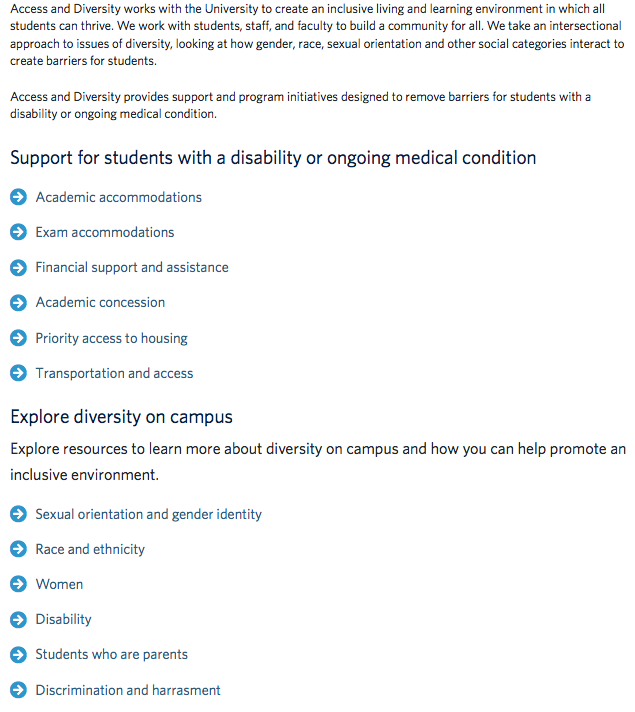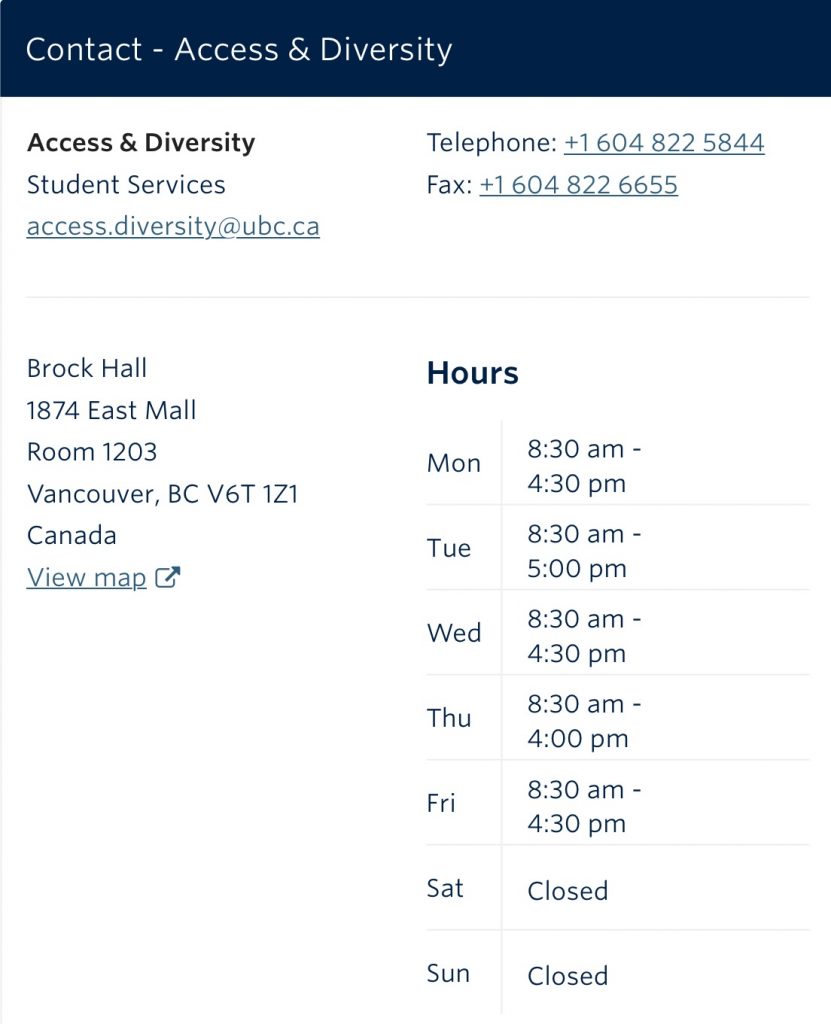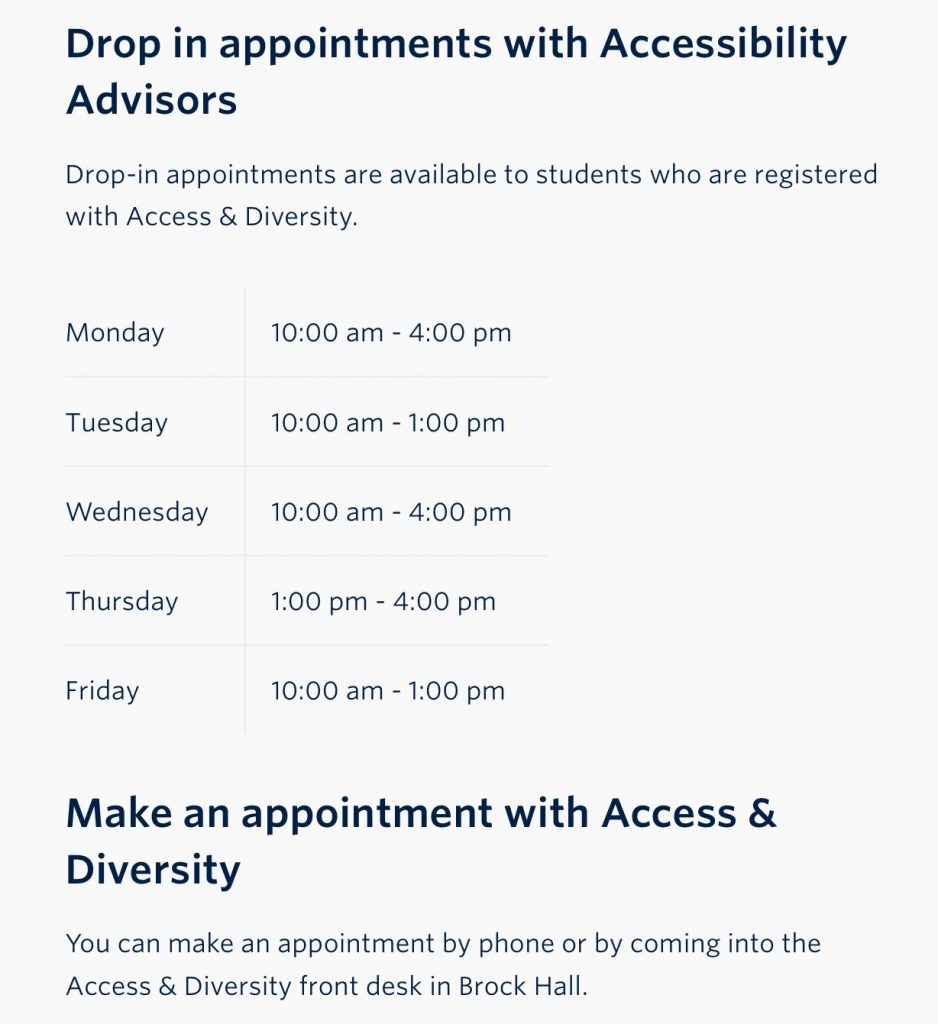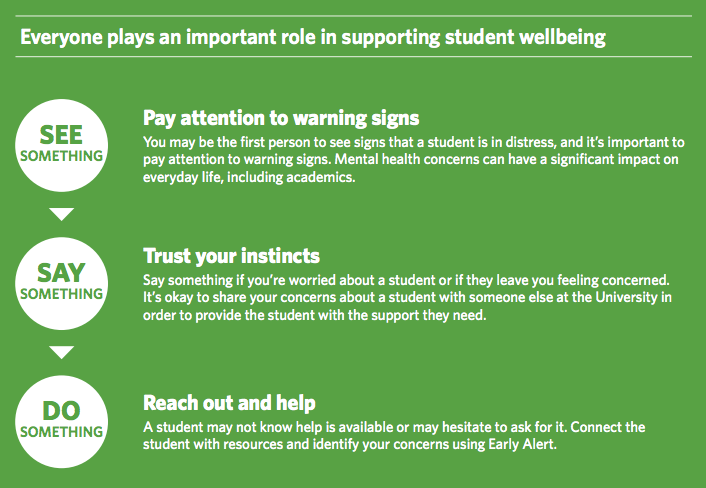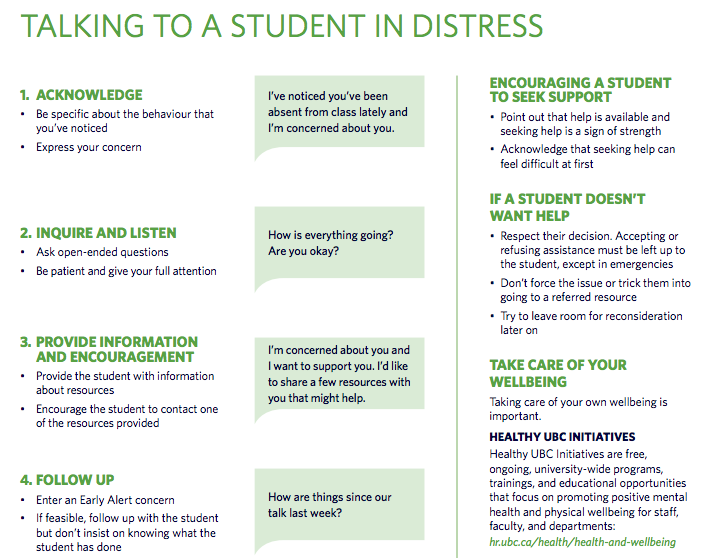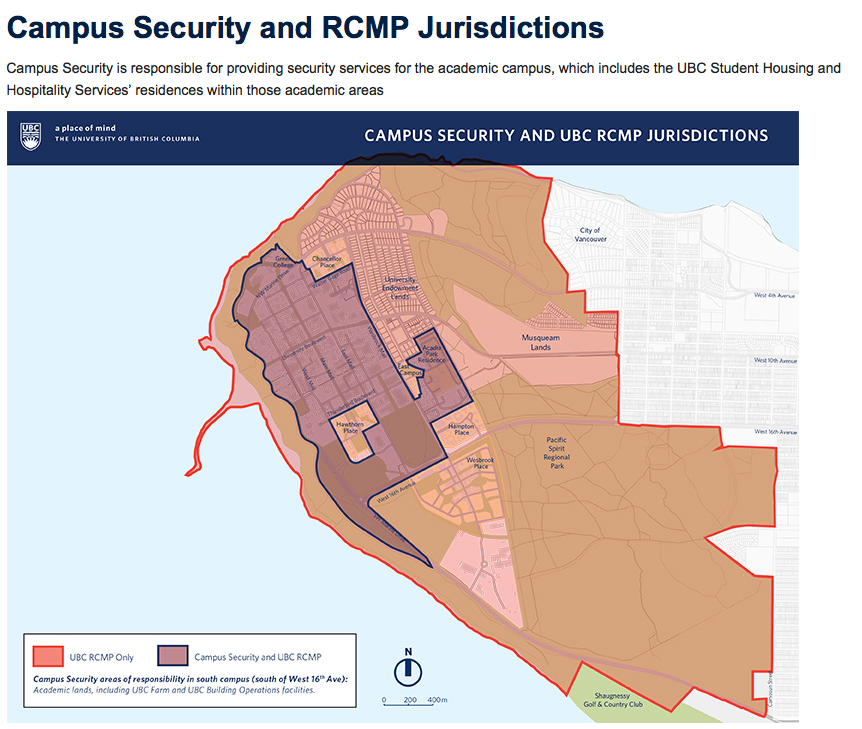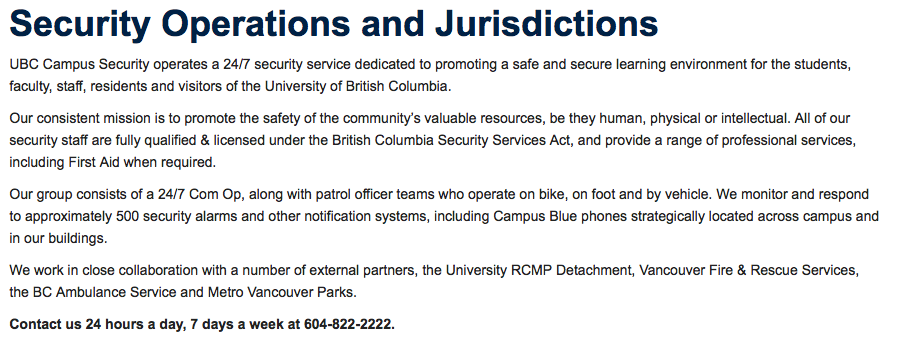
I (Dr O’Brien) am sharing some general useful resources below: openly-accessible freely-available information from the University. I use these resources a lot in the advising side of my work, you might also find them helpful, and they could also help you to help someone else. There are many people here at UBC who can help; even if it is “just” talking to someone with whom you feel comfortable and whom you trust, who will listen to you, that alone is already a vital service.
The same goes for any need to talk and to find support, whether something has happened to you or to someone you know, and also if nothing has happened but you worry that it might. Even if sometimes this seems like an overwhelmingly large university, and impersonal through its size and complexity: UBC is a compassionate caring community, made up of individual human beings.
QUICK NAVIGATION:
- UBC French
- Academic advising
- Student support, including how to help other students
- Safety, accidents, emergencies
- UBC policies, procedures, rules, & regulations
UBC FRENCH
- FREN 101 contact information
= your instructor and the course coordinator - Days, times, and classroom locations of all the sections for FREN 101 are at UBC Student Services > Course Schedule > FREN 101
- The Department of French, Hispanic and Italian Studies
- FHIS > Undergraduate French > Advising and their FAQ
- FHIS French tutors list (not free)
- FHIS Learning Centre (free and fabulous!) – NB winter session only
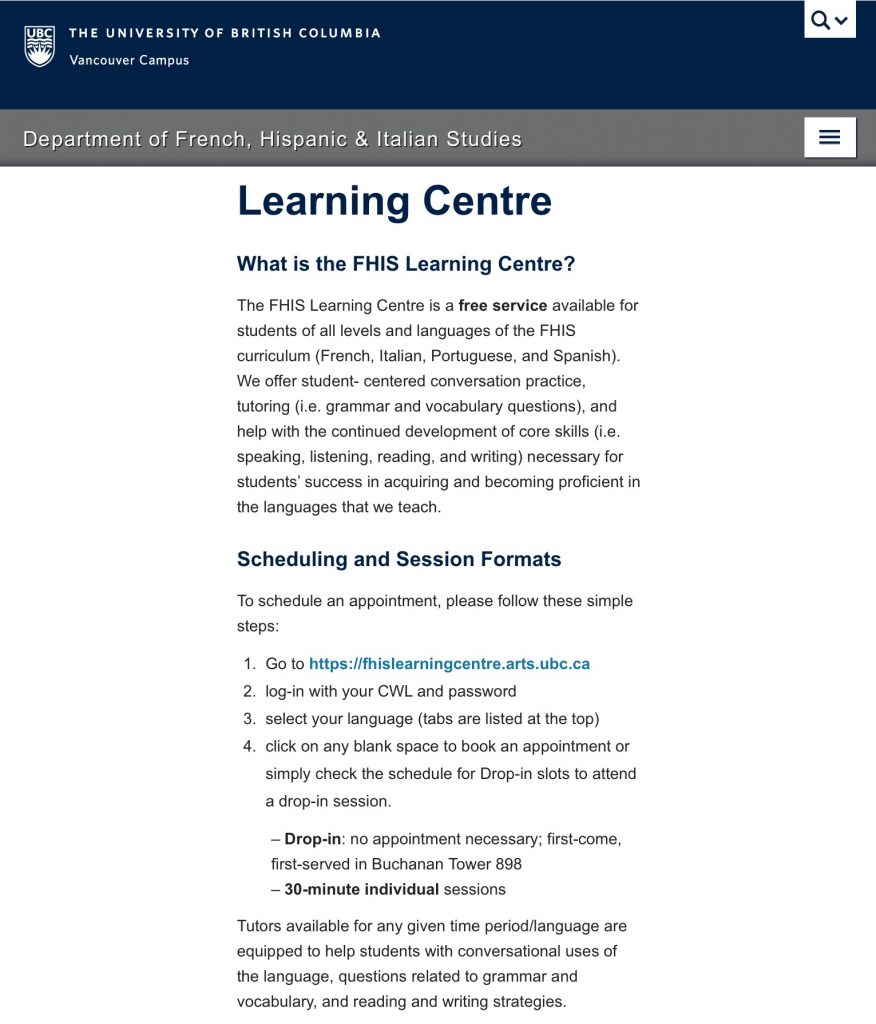
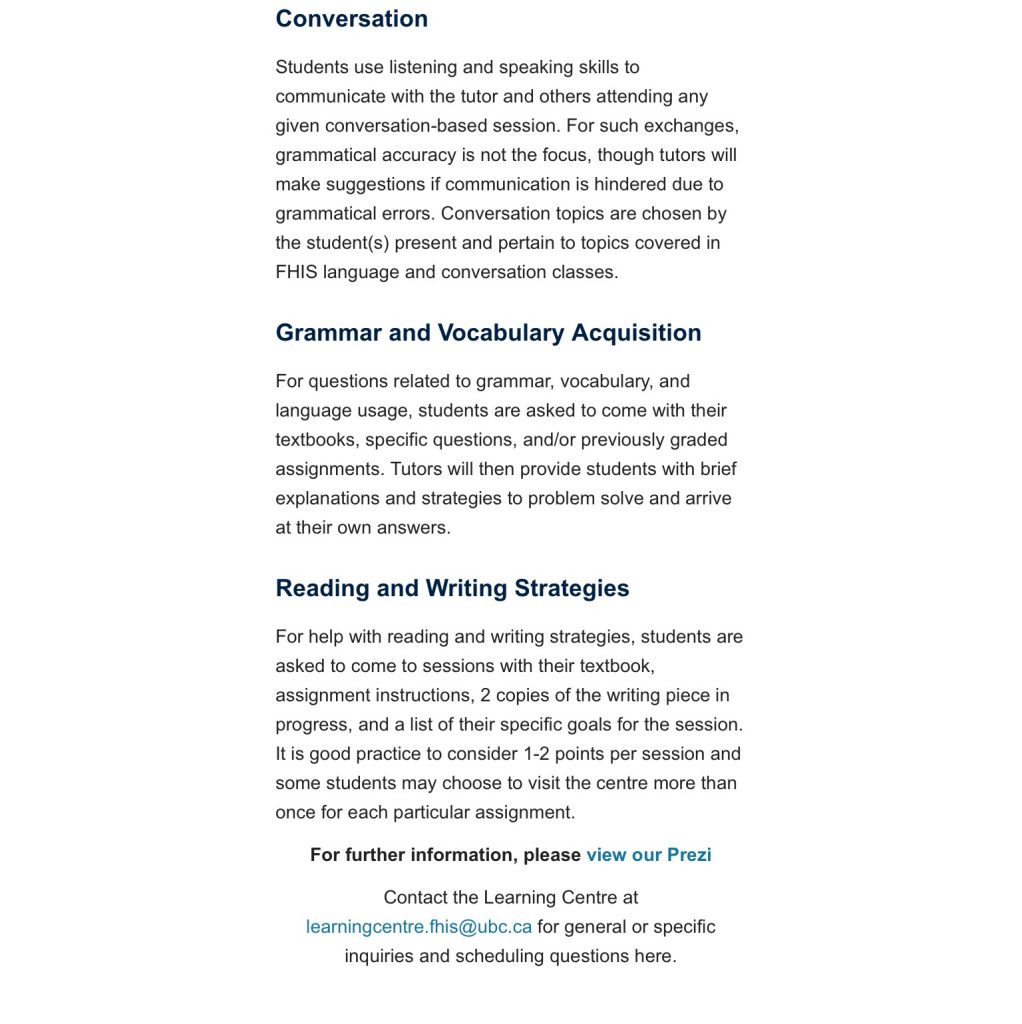
ACADEMIC ADVISING
Through talking with them about academic matters during your time here, you may have already formed relationships with individuals with whom you would consider talking about other matters.
Academic advising at the departmental level may be another set of people to talk to, and again as with advising at the Faculty or School level, this is not just about a narrow sense of immediately academic matters: for example, here are the Academic Advisers in French, Hispanic & Italian Studies; students regularly talk to us about many things, all of which (and pastoral care) form part of any individual’s whole well-being.
UBC FACULTY OF ARTS
- Arts Student Support: students.arts.ubc.ca/student-support
- Arts Academic Advising: students.arts.ubc.ca/advising
Buchanan D111
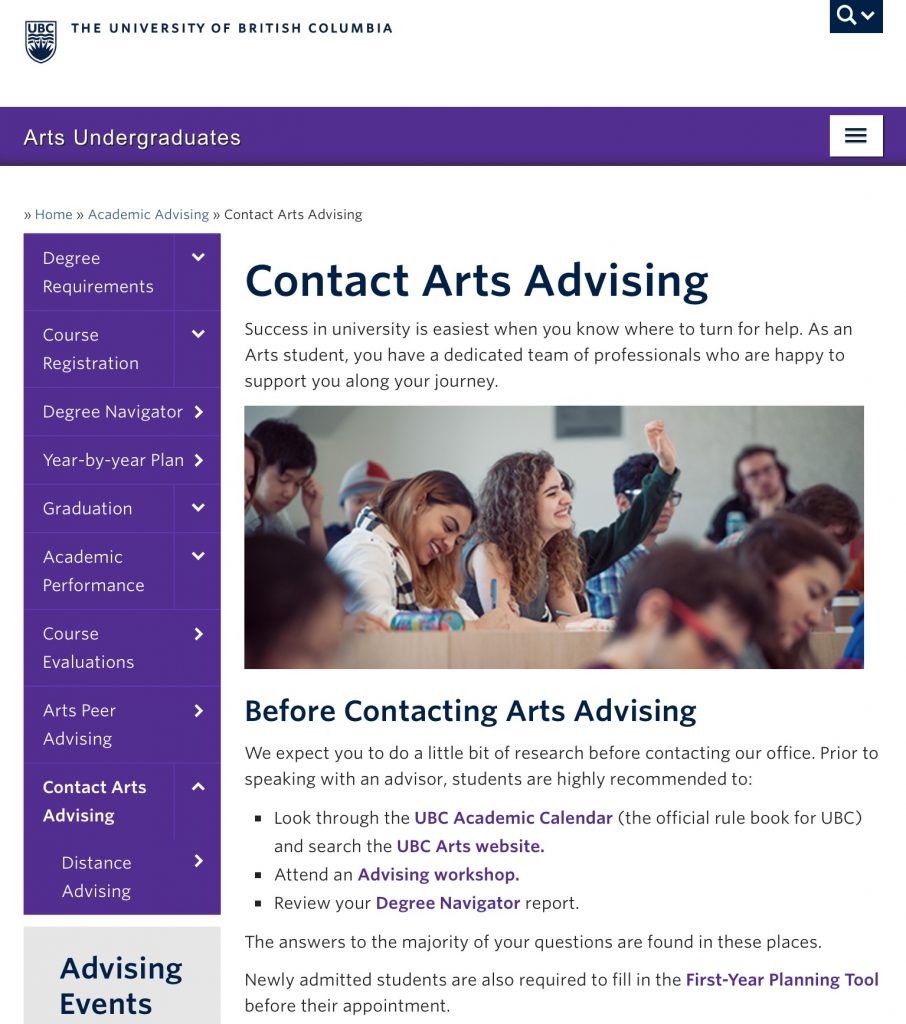
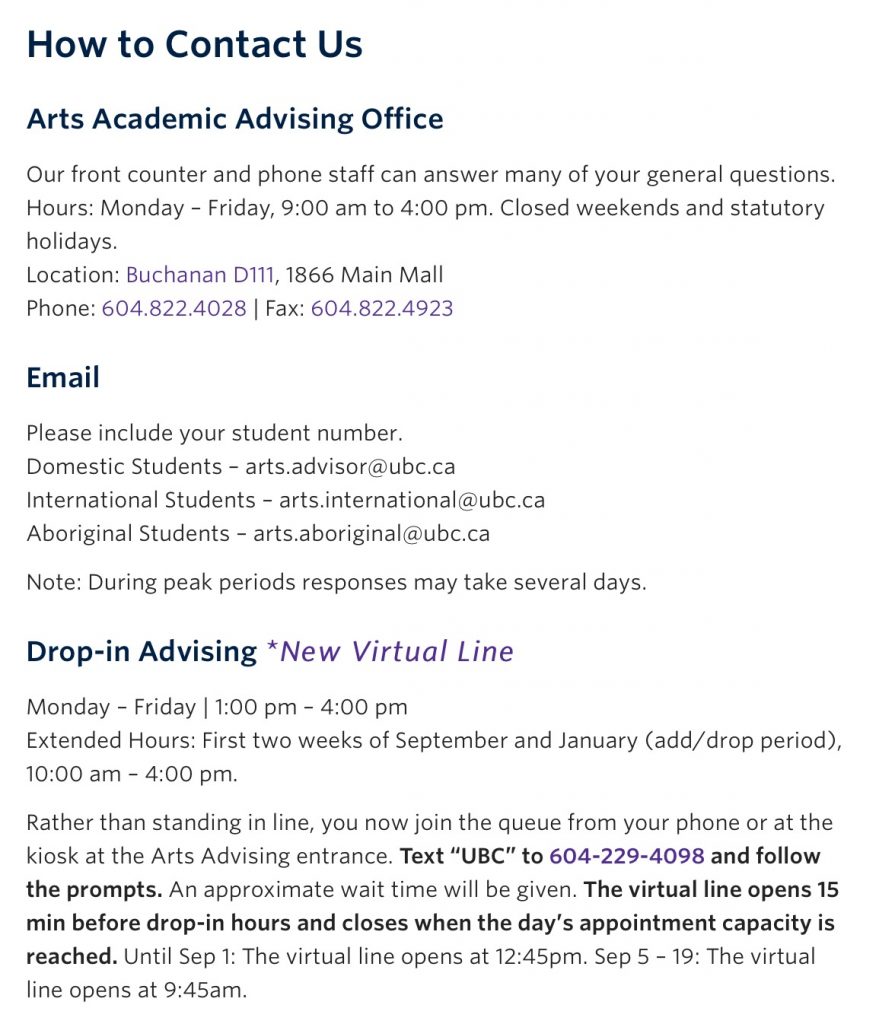
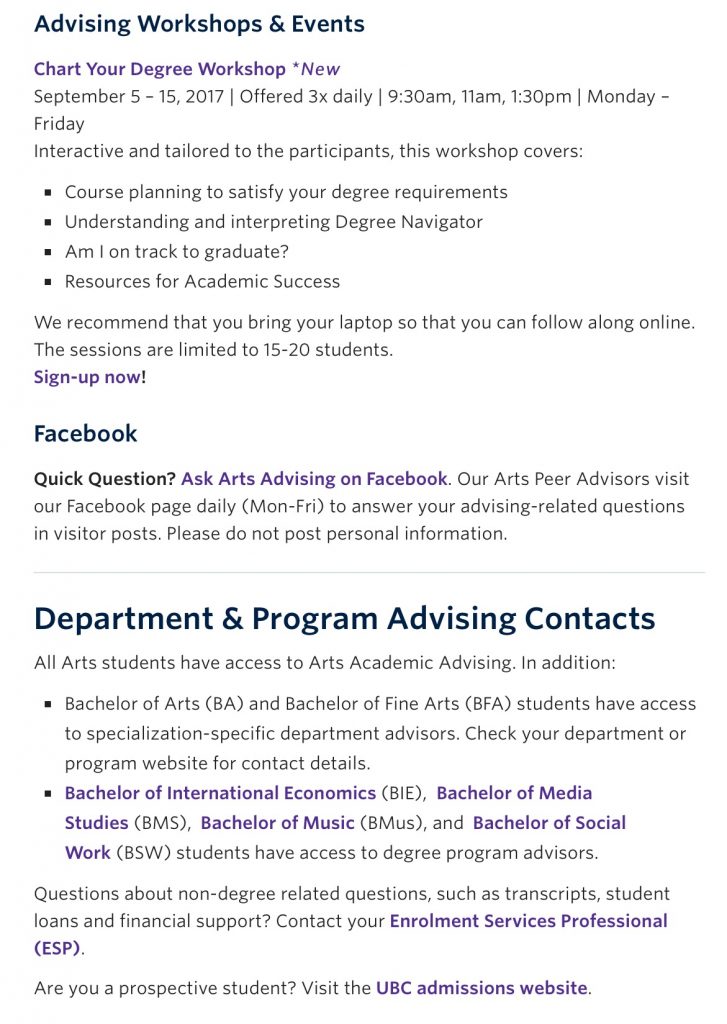
- Faculty of Arts grading guidelines: any course marks and your final grade may be adjusted to comply with these guidelines. For a version of these guidelines used by FHIS, see: Grading Guidelines for Content-Based Courses (Department of French, Hispanic and Italian Studies, UBC)
IF YOU ARE NOT IN THE FACULTY OF ARTS…
- Academic advising for all Faculties and Schools (not just the Faculty of Arts)
 STUDENT SUPPORT
STUDENT SUPPORT
IN IMMEDIATE PROXIMITY + YOUR AMS
(1) Undergraduate residential advisers, and other student leaders who have had bystander & ally training
(2) Neighbours, friends, and classmates
(3) Faculty and other instructors (graduate-student teaching assistants, for example): you see us a lot, and we are here for you
(4) AMS:
- Speakeasy:
provides free, confidential, one-on-one peer support for UBC students facing a wide variety of challenges
AMS Nest 1314
Monday-Friday 11:00 a.m. to 7:00 p.m.
To make an apppointment: come by the Speakeasy reception desk on the main floor of the AMS Nest, across from Merit Travel (room 1314) or drop by their office in the Services Wing of the AMS Nest (room 3107L). - Sexual Assault Support Centre:
offers free, confidential crisis and emotional support; committed to the education, support, and empowerment of people of all genders who are survivors of sexualized violence as well as their friends and family
AMS Nest 3127
Tel.: 604-827-5180
Monday-Sunday 8:00 a.m. to 10:00 p.m. - Resource groups: Colour Connected, Pride, Social Justice Centre, Women’s Centre
ACADEMIC ADVISING
Through talking with them about academic matters during your time here, you may have already formed relationships with individuals with whom you would consider talking about other matters.
Academic advising at the departmental level may be another set of people to talk to, and again as with advising at the Faculty or School level, this is not just about a narrow sense of immediately academic matters: for example, here are the Academic Advisers in French, Hispanic & Italian Studies; students regularly talk to us about many things, all of which (and pastoral care) form part of any individual’s whole well-being.
- Arts Student Support: students.arts.ubc.ca/student-support
- If you are in another faculty: Academic advising for all Faculties and Schools
STUDENT SUPPORT: LOOK AFTER ONE ANOTHER
- Information for students, and for students concerned about other students
- Arts Student Support: students.arts.ubc.ca/student-support
- UBC Student Services: students.ubc.ca
- UBC Wellness Services
Barber Learning Centre 183
Monday, Wednesday, Thursday, & Friday 10:00-5:00
Tuesday 10:00-4:00 - UBC Sexual Violence Prevention and Response
ACCESS & DIVERSITY
- Access & Diversity: students.ubc.ca/about/access
- Brock Hall 1203
- Email : access.diversity@ubc.ca
- ‘Phone: 604.822.5844
THE GREEN FOLDER
- The Green Folder : Student services > Assisting students in distress
= a very useful resource for faculty and for students, as everyone plays a role in supporting student wellbeing: we are all one community - Step 1: Observe
- Steps 2 and 3: Reflect and respond
- Step 4: Use Early Alert
- Talking to a student in distress
- Where students can go for help
- Encouraging a student to seek support

- downloadable PDF
EARLY ALERT
- Student Services – Faculty & Staff Resources > Early Alert
= a one-stop shop for help, that brings together all of UBC’s support services under one virtual roof. Faculty and other instructors may use this to refer you for help and expert advice. (We’re all fabulous but we’re not superhuman: yes, there are limits to academic faculty expertise and abilities!) - Early Alert > Information for students
- The faculty version, FYI: because all this information is open to all, and it’s always good to see all perspectives in order to understand something better
AND HERE’S EVEN MORE UBC SUPPORT, SERVICES, RESOURCES …
- Resources for students c/o UBC Student Services have information and offer help:
Academic matters
Accommodation for disability
Career
Discrimination and harassment
Fair treatment
Financial concerns
Health
International student matters
Legal advice
Mental and physical wellbeing
Personal safety and security
Sexualised violence
Student-led programs
Wellbeing - the Office of the Ombudsperson for Students
→ their overview
→ fairness info sheet, fairness toolkits & other resources
→ their FAQs

SAFETY, ACCIDENTS, EMERGENCIES
- Student Services > assisting students in distress
- UBC Green Folder, for assisting students in distress
- 604.822.2222 = UBC Campus Security
- 604.822.4444 = Campus First Aid
- 911 = emergency services (ambulance, fire, police): on the UBC campus, call UBC Campus Security first (for practical reasons: the fastest response)
UBC POLICIES & PROCEDURES & RULES & REGULATIONS
A quick selection of some of the most important ones…
- expectations:
student declaration and responsibilities: a reminder that upon registering as a student, you initiated a contract with the University and are bound by the following declaration:
“I hereby accept and submit myself to the statutes, rules and regulations, and ordinances (including bylaws, codes, and policies) of The University of British Columbia, and of the faculty or faculties in which I am registered, and to any amendments thereto which may be made while I am a student of the University, and I promise to observe the same.”
[…] Students are required to inform themselves of the statutes, rules and regulations, and ordinances (including bylaws, codes, and policies) and to any amendments thereto applicable at the University. For policies and procedures issued by the Board of Governors, see the University of British Columbia Policy and Procedure Handbook or the Office of the University Counsel for the official text. For policies issued by the Vancouver Senate, see the Senate for up-to-date copies.
The University authorities do not assume responsibilities for others that naturally rest with adults themselves. This being so, the University relies on the good sense and on the home training of students for the preservation of good moral standards and for appropriate modes of behaviour […]
The University and University authorities are not obligated to enforce any statutes, rules, regulations, or ordinances (including bylaws, codes or policies) if discretionarily enforceable by law or made under its, or their, power or authority.
